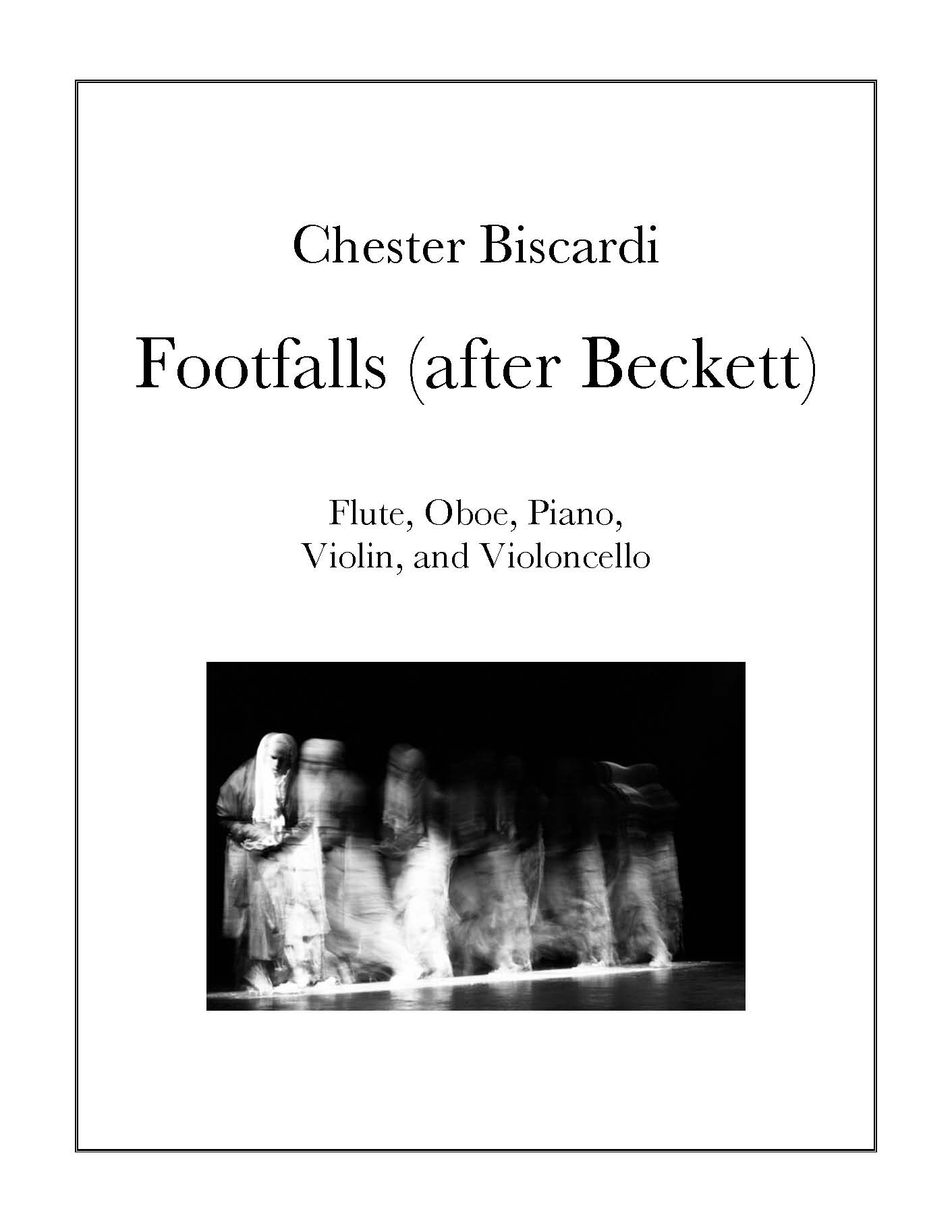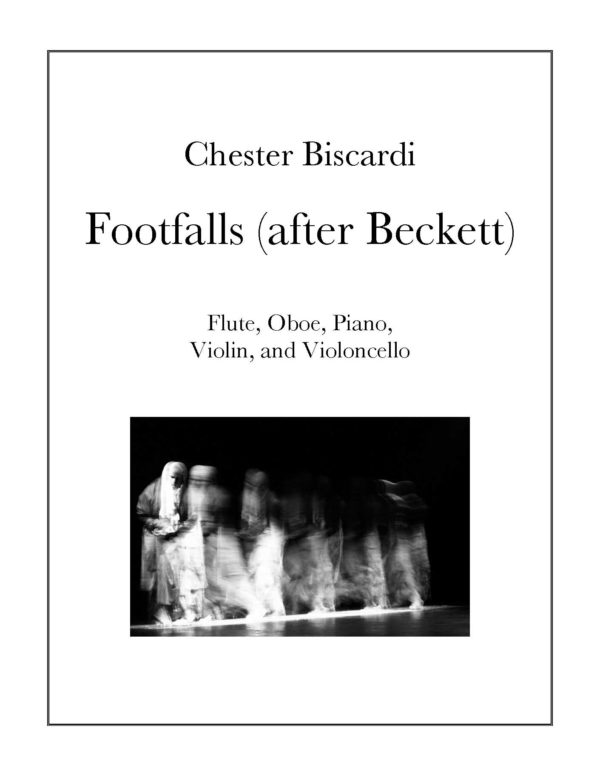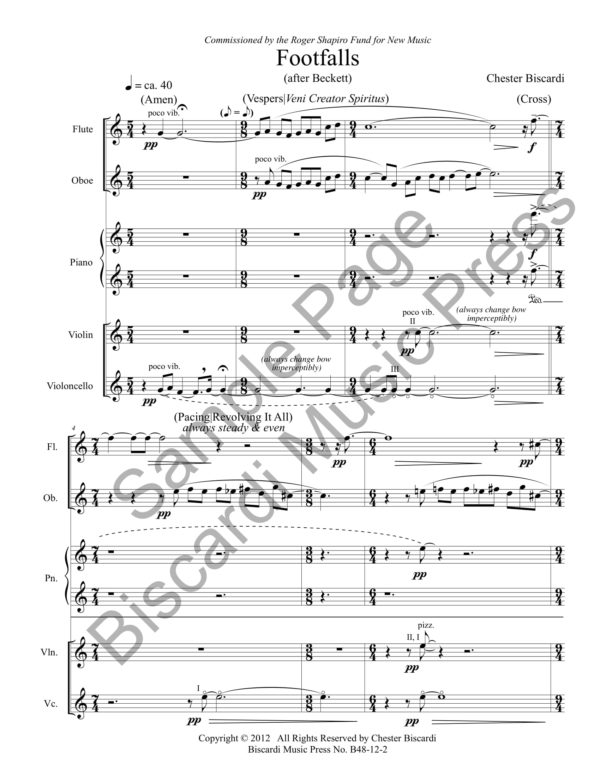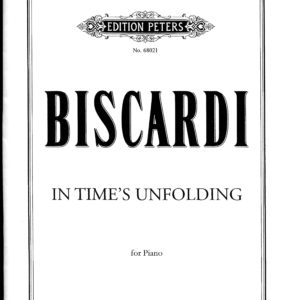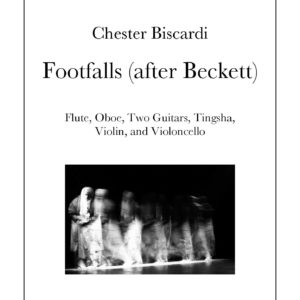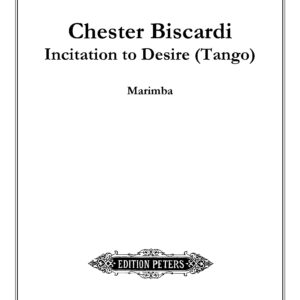Description
Premiere
Kathleen Chalfant & Holly Twyford, Actors
Joy Zinoman, Founding Artistic Director,
The Studio Theatre in Washington, DC
Cygnus Ensemble,
William Anderson, Music Director
Off-Broadway Production of Sounding Beckett
September 14, 2012 (preview)
September 15, 2012 (opening night)
September 23, 2012 (matinee)
Classic Stage Company
New York City
First Performance of Piano Version: Jenny Davis, flute, Zach Pulse, oboe, Alexandra Matloff, violin, Gregorgiy Khoklov, cello, and Clare Longendyke, piano; Middlebury Town Hall Theater, New Music On the Point; Middlebury, Vermont; June 13, 2104
Commissioner
Commissioned by the Roger Shapiro Fund for New Music for Sounding Beckett, a collaborative project between The Studio Theatre in Washington, DC, Joy Zinoman, Founding Artistic Director, and Cygnus Ensemble, William Anderson, Music Director
Publisher
Biscardi Music Press No. B48-12-2
Distribution: Theodore Front Musical Literature, Inc.
Program Notes
Footfalls (after Beckett) is a musical response to Samuel Beckett’s play, Footfalls (1975). The play itself has a clear and stunning musical structure. It incorporates markers – a fading bell and an increasingly faint strip of light – that delineate the four major divisions of the play. In addition, there are nine subdivisions of the larger structure highlighting the importance of the number nine. May, the only character on stage, slowly paces nine lengths, turns (“wheels”), and relentlessly retraces her steps. Her pacing is one of nine elemental ideas that become textual clues for the musicians in their interpretation of the score; they suggest the deep feelings that lie at the basis of both Beckett’s play and my music. Not in keeping with Beckett’s structure, my sequencing of these ideas is as follows: Amen|Vespers; Cross; Pacing|Revolving It All; Bell; May; Strip of Light; Mother; The Semblance; and Old Mrs. Winter & Amy. This musical response focuses on the play as a haunting and observes its characters – real? imagined? disembodied? interchangeable? – as they, like smoke, gradually evaporate and return to stillness.
Footfalls (after Beckett) was commissioned by the Roger Shapiro Fund for New Music for Sounding Beckett, a collaborative project between The Studio Theatre in Washington, DC, Joy Zinoman, Founding Artistic Director, and Cygnus Ensemble, William Anderson, Music Director. It was produced by Marsyas Productions and premiered Off Broadway at Classic Stage Company, New York City, in September 2012, featuring Kathleen Chalfant as the Woman’s Voice (Mother) and Holly Twyford as May. Originally produced by the Library of Congress in Washington DC, the project expanded into a presentation of three of Beckett’s late plays, Footfalls (1975), Ohio Impromptu (1980), and Catastrophe (1982, written for Vaclav Havel), alternating with premiere compositions representing diverse musical responses to the plays.
Note: This is an alternate version of the original work, which is scored for flute, oboe, two guitars, tingsha, violin and violoncello. The piano replaces the two guitars, and there are no tingsha.
Press
The most successful pairing comes first. Actress Holly Twyford performs "Footfalls," but rather than picking up her feet and walking, she shuffles along in a rhythmic pattern that creates a visible mark on the bare black stage. Her character is someone who has been taking care of her ailing mother (voiced by a pre-recorded Kathleen Chalfant), and has never really gotten to live her own life. She paces incessantly, and there's a frustration and sadness to both her movements and her prolonged moments of stillness.
Composer Chester Biscardi echoes these qualities in the brief instrumental piece that follows. There's a haunting, ethereal sound to the music.
"Footfalls," in which Holly Twyford plays the haggard and trapped May, who paces within a single beam of light on the stage floor. Kathleen Chalfant provides the purring disembodied voice of May's mother, who is either dying or has already died. Nonetheless, May continues to converse with her, methodically shuffling back and forth along the lighted path. It's a marvelous visual conceit, matched by her mother's disembodied words: "Will you never have done revolving it all? In your poor mind?" Beckett calls for Chalfant to repeat "it all" a few times in voiceover, both robbing the words of any meaning and somehow extending them to encompass all meanings. Chester Biscardi's airy, atmospheric musical response to "Footfalls" [is] elegantly composed.

